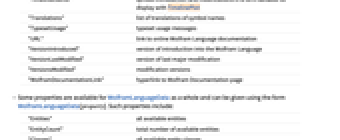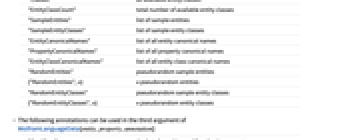WolframLanguageData[entity,property]
gives the value of the specified property for the Wolfram Language symbol entity.
WolframLanguageData[{entity1,entity2,…},property]
gives a list of property values for the specified Wolfram Language symbol entities.
WolframLanguageData[entity,property,annotation]
gives the specified annotation associated with the given property.


WolframLanguageData
WolframLanguageData[entity,property]
gives the value of the specified property for the Wolfram Language symbol entity.
WolframLanguageData[{entity1,entity2,…},property]
gives a list of property values for the specified Wolfram Language symbol entities.
WolframLanguageData[entity,property,annotation]
gives the specified annotation associated with the given property.
Details






- WolframLanguageData[] gives a list of all Wolfram Language symbols.
- WolframLanguageData["Properties"] gives a list of available properties.
- WolframLanguageData["SampleEntities"] gives a list of sample entities.
- The specified entity in WolframLanguageData can be an Entity, EntityClass, entity canonical name, or list thereof.
- The specified property can be an EntityProperty, EntityPropertyClass, property canonical name, or list of properties.
- Properties that do not apply or are not known in a particular case are indicated by Missing[…].
- Properties include:
-
"Attributes" symbol attributes "CharacterCount" number of characters in symbol "CloudSupportNotes" notes about symbol support in the Wolfram Cloud "CloudSupportStatus" status of symbol support in the Wolfram Cloud "CommonOptionValues" rule list of options with associated common values "DateIntroduced" date of introduction into the Wolfram Language "DateLastModified" date of last major modification "DatesModified" modification dates "DocumentationBasicExamples" documentation of basic example inputs and outputs "DocumentationExampleCounts" rule list of documentation classes and associated example counts "DocumentationExampleInputs" rule list of documentation example classes and associated example inputs "DocumentationExampleText" rule list of documentation example classes and associated example text "EponymousPeople" people after whom symbol is named "EqualPrecedenceSymbols" list of symbols sharing the same operator input precedence "ExternalLinks" external links "Frequencies" list of usage frequencies from several domains "FullVersionIntroduced" full version of introduction into the Wolfram Language "FullVersionLastModified" full version of last major modification "FullVersionsModified" full version of modifications "FunctionEssay" textual description and background about symbol use "FunctionalityAreas" functionality areas "KeyboardShortcuts" keyboard shortcuts "Memberships" classes "Name" symbol name "OptionNames" names of options taken by symbol "Options" options "PlaintextUsage" plain text usage "PrecedenceRanks" rule list of operator input forms and their corresponding ranks "Ranks" list of usage ranks from several domains "RelatedEntities" related entities "RelatedGuidePages" related guide page hyperlinks "RelatedSymbols" related symbols "RelationshipCommunityGraph" community graph of relationship with other symbols "RelationshipGraph" graph of relationship with other symbols "ShortNotations" short notations "SubjectClassifications" rule list of subject classifications and their corresponding standards "SymbolsLinkingTo" symbols linking a given symbol in their documentation "SymbolsUsingAsAttribute" symbols using a given symbol as an attribute "SymbolsUsingAsOption" symbols using a given symbol as an option "TextStrings" plain text strings "Timeline" timeline of symbol introduction and modifications "TimelineEvents" symbol introduction and modifications in a form suitable for display with TimelinePlot "Translations" list of translations of symbol names "TypesetUsage" typeset usage messages "URL" link to online Wolfram Language documentation "VersionIntroduced" version of introduction into the Wolfram Language "VersionLastModified" version of last major modification "VersionsModified" modification versions "WolframDocumentationLink" hyperlink to Wolfram Documentation page - Some properties are available for WolframLanguageData as a whole and can be given using the form WolframLanguageData[property]. Such properties include:
-
"Entities" all available entities "EntityCount" total number of available entities "Classes" all available entity classes "EntityClassCount" total number of available entity classes "SampleEntities" list of sample entities "SampleEntityClasses" list of sample entity classes "EntityCanonicalNames" list of all entity canonical names "PropertyCanonicalNames" list of all property canonical names "EntityClassCanonicalNames" list of all entity class canonical names "RandomEntities" pseudorandom sample entities {"RandomEntities",n} n pseudorandom entities "RandomEntityClasses" pseudorandom sample entity classes {"RandomEntityClasses",n} n pseudorandom entity classes - The following annotations can be used in the third argument of WolframLanguageData[entity,property,annotation]:
-
"Qualifiers" the list of possible qualifiers for the property "QualifierValues" the list of possible values that can be given to each qualifier "Description" a brief textual description of the property
Examples
open all close allBasic Examples (6)
Scope (9)
Names and Classes (1)
Properties (5)
Return people after whom the RiemannSiegelTheta function is named:
Return a property of two symbols simultaneously:
Return multiple properties of multiple symbols simultaneously:
Show classes of functions in the Wolfram Language:
Use an implicitly defined entity class to find Wolfram Language symbols in a given area of functionality:
Show translations of the Wolfram Language function Sum:
Property Qualifiers (2)
By default, "Frequencies" and "Ranks" return a list of values:
Use the "Corpus" qualifier to return values for a single corpus:
Return the five most commonly used Wolfram Language symbols using an implicitly defined entity class:
By default, "Translations" returns translations in all available languages:
Use the "Language" qualifier to return values for a single corpus:
Applications (10)
Display a word cloud of the documentation for NormalDistribution:
Use an implicitly defined entity class to return a list of Wolfram Language symbols introduced in Version 13:
Select symbols with Constant attribute:
Return the shortest symbols in the Wolfram Language:
Return the longest symbols in the Wolfram Language:
Select functions that take the MaxIterations option:
Retrieve symbols added in Versions 10–10.4 and modified in Version 11:
Find the most-used Wolfram Language symbols:
Use an implicitly defined entity class:
Get the result as an entity association:
Use an implicitly defined entity class to return a list of Wolfram Language symbols named after Gauss:
Find the tallies of Wolfram Language symbols named after n people:
Show the first several symbols named after two people:
Properties & Relations (4)
Using WolframLanguageData is equivalent to calling EntityValue on the corresponding entity and property:
Evaluate WolframLanguageData with "Classes" argument:
The above is equivalent to evaluating EntityClassList of the entity type "WolframLanguageSymbol":
Given entities corresponding to various Wolfram Language symbols:
Show Wolfram Language symbols related to various geometric entities:
Possible Issues (1)
Entity classes cannot be given as bare strings:
Specifying an explicit EntityClass works as intended:
This is equivalent to calling EntityList on the EntityClass:
Interactive Examples (2)
Documentation example outputs remain interactive when called as WolframLanguageData properties:
Give an association of all WolframLanguageData properties and values for Sin:
Create a simple menu interface for selecting a property to display:
Neat Examples (6)
Show the cumulative numbers of Wolfram Language symbols introduced in successive major versions of Mathematica:
View the growth in the number of Wolfram Language symbols as a function of calendar year:
Plot a histogram of symbol lengths in the Wolfram Language:
View a timeline for people born between 1800–1850 after whom Wolfram Language symbols are named:
Plot real-world usage frequency for Wolfram Language symbols against usage rank for major releases of Mathematica:
Create a collage of basic documentation example outputs for Plot:
Related Guides
History
Introduced in 2015 (10.2) | Updated in 2015 (10.3) ▪ 2016 (10.4) ▪ 2017 (11.1) ▪ 2018 (11.3) ▪ 2019 (12.0) ▪ 2020 (12.1) ▪ 2020 (12.2) ▪ 2021 (12.3) ▪ 2021 (13.0)
Text
Wolfram Research (2015), WolframLanguageData, Wolfram Language function, https://reference.wolfram.com/language/ref/WolframLanguageData.html (updated 2021).
CMS
Wolfram Language. 2015. "WolframLanguageData." Wolfram Language & System Documentation Center. Wolfram Research. Last Modified 2021. https://reference.wolfram.com/language/ref/WolframLanguageData.html.
APA
Wolfram Language. (2015). WolframLanguageData. Wolfram Language & System Documentation Center. Retrieved from https://reference.wolfram.com/language/ref/WolframLanguageData.html
BibTeX
@misc{reference.wolfram_2025_wolframlanguagedata, author="Wolfram Research", title="{WolframLanguageData}", year="2021", howpublished="\url{https://reference.wolfram.com/language/ref/WolframLanguageData.html}", note=[Accessed: 25-February-2026]}
BibLaTeX
@online{reference.wolfram_2025_wolframlanguagedata, organization={Wolfram Research}, title={WolframLanguageData}, year={2021}, url={https://reference.wolfram.com/language/ref/WolframLanguageData.html}, note=[Accessed: 25-February-2026]}